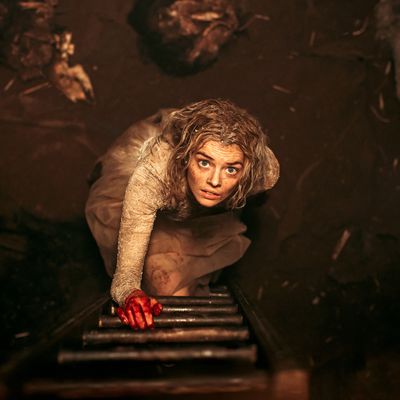
As far back as I can remember, I have considered marriage a prison for women. Perhaps it’s the stories I’m greeted with nearly every day of intimate violence around the country — women habitually brutalized, burned alive by their partners, arrested for handing in their abusive husbands’ guns out of fear. Perhaps it’s the violence that cuts closer to home, reverberating in the stories I’ve heard from aunts, friends, strangers in group therapy, and my own mother. Pop culture has done little to dissuade me of my belief. The fear of never truly knowing your partner pervades even classic works like Alfred Hitchcock’s quicksilver Suspicion, starring Joan Fontaine and Cary Grant, and the seductive fairy-tale Bluebeard. This is why Samara Weaving’s guttural scream in Ready or Not hits with such force — it has eons of anger behind it.
Weaving plays Grace, a new bride who finds herself mired in the eccentricities of her husband Alex Le Domas’s (Mark O’Brien) exceedingly wealthy family. The portents are there if only Grace would pay attention. The sharp-edged Aunt Helene (Nicky Guadagni), who stares at Grace with murderous intent. The strange ritualism with which a late-night game is chosen post-wedding; her in-laws claim it’s a welcome-to-the-family tradition. And the ripple of shock that envelopes the family when they realize the game they’ll be playing is hide-and-seek. It’s not until Grace witnesses a maid take a bullet in the face that she realizes the stakes of the game are life or death. If she isn’t found and killed before dawn, the powerful family believes they’ll die instead. At the start of the hunt, it’s clear that the filmmakers are, for now, less concerned with articulating the particulars of the Le Domas’s mythology (in short, their wealth is the result of a complex pact with the devil), and more interested in laying bare the crumbling institution of marriage and the vapid morals of the one percent.
Even as Ready or Not skewers the emptiness of the rich and exaggerates the terror of in-laws, the film never takes itself too seriously, preferring instead to have delirious fun critiquing the behaviors of the status-obsessed. Along the way there is violence, and directors Matt Bettinelli-Olpin and Tyler Gillett don’t shy away from the catharsis that comes with each character’s brutality. The flood of jokes about inherited wealth and vapidity wouldn’t hit so well if it weren’t for the distinctiveness of each of the family members. Andie MacDowell gives a slippery performance as the family’s matriarch Becky, her sweet voice as much a weapon as the bow and arrow she carries. One of the most immediately intoxicating turns in the film comes from Adam Brody as the alcohol-soaked failure of a son Daniel, who regards the violent familial rituals with contempt. Brody plays Daniel with a miasma of both disappointment and disregard hanging over him. Early on, when his wife snarks that Grace will never be a part of the family, he relishes the thought: “Of course not, dear, she has a soul.”
In terms of memorable moments, the image of Grace in her ripped-up wedding dress and Chuck Taylors, holding a shotgun high with bullets strapped to her chest, is immediately framed as iconic. Grace herself, peering at her visage in a mirror, is taken aback. But the promise of the costume — that Grace would mete out vengeance — isn’t exactly what’s delivered. Instead, she’s meant to barely survive a series of hellish duels and near misses. At one point she learns that the bullets strapped to her chest are display only. When Grace does get a chance to dole out violence, it’s less expertly executed than brutally, messily purgative. While the film hits the right notes in terms of its devious delights and horrifying set pieces — one including a not-so-well-placed nail and a pit of corpses — I wish it took its commentary on the perils of marrying someone powerful who’s hidden a crucial part of themselves a step further. The film toys with how class can disenfranchise a partner in marriage, briefly emphasizing that Grace grew up in a foster home, but the most interesting aspects of this thread diffuse when the finer points of the Le Domas satanic ritual eventually gains center stage.
Even then, Samara Weaving’s performance is dynamic enough that any lingering issues fade away in the face of her. Ready or Not is subtly pockmarked by needling decisions — namely the heavy-handed score by Brian Taylor that doesn’t trust the audience and often lessens the impact of the film’s most thrilling moments. But at its best, the movie is a vicious, richly funny, and artfully brutal tale that places Weaving’s performance as its gravitational center. She lends Grace a scrappy, sharp energy that beguiles. She’s best in both the quiet moments, when dread multiplies as she creeps through the home past butlers and the sharp ends of axes, as well as in the scenes that call for her to scream wildly in the wake of great violence, vocalizing the trauma building inside of her. For all the blood and mayhem in Ready or Not, it is Weaving’s guttural, feral scream that elicits the most terror as it begs us to bear witness to the horrors of marriage.


